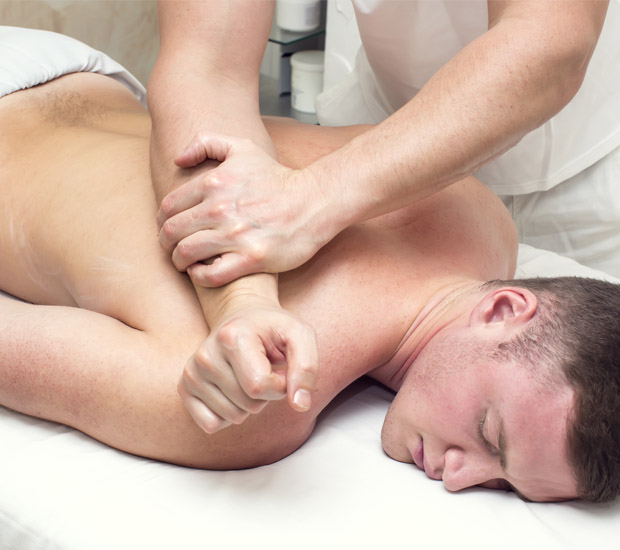Therapeutic MassageTampa, FL
A therapeutic massage can help to relieve pain, soreness, or other symptoms by being incorporated into a chiropractic treatment plan. Our team can determine if this type of massage is the right fit for patients. By supplementing treatment plans, therapeutic massages will help enhance the patient’s experience.
If you are considering a therapeutic massage but are unsure if it is right for you, give us a call at (813) 518-0566 for more information or to schedule an appointment.
What is Therapeutic Massage?
Therapeutic massage is a broad term for any type of massage that helps relieve pain, reduces stress, or address a specific problem. It combines methods from relaxation and remedial massage. This specific style of massage focuses on treating and mobilizing soft tissue, such as muscles, tendons, and fascia, in order to restore full and functional use. They are typically done by a licensed and certified massage therapist. While they may be relaxing, the results should last longer than a typical massage.
While patients can use therapeutic massage in a limited capacity, many people with high-stress and highly physical careers use it as part of their regular wellness routine. These individuals may be athletes, general laborers, or office workers. People of any age can benefit from therapeutic massage techniques. It can be a suitable part of complementary treatment plans for pregnant people, those with disabilities, and people with severe medical conditions.
Types of Therapeutic Massage
There is not a one-size-fits-all treatment for all patients. There are several different types of massage therapy that we offer patients, including:
- Deep Tissue Massage: Deep tissue massage targets painful and tense muscle spots of the body by using deep strokes to help release the tightness in muscles and tendons. People with chronic pain, recovering from an injury, and general muscle tightness can benefit from a deep tissue massage.
- Lymphatic Massage: Lymphatic fluid helps maintain fluid levels and removes waste from the body. Lymphatic massage uses gentle touches to help the fluid flow more freely, helping patients with extensive inflammation achieve relief.
- Prenatal Massage: Prenatal massage helps people in various stages of pregnancy relax and find relief from any discomfort. .It can help to take pressure off the hips and reduce swelling in the feet and legs, benefitting both the client and the baby.
- Sports Massage: This specific type of massage therapy focuses on preventing and treating injuries, improving performance, and helping enhance flexibility in athletes.. The treatment is similar to Swedish massage, but it focuses more on specific areas of the body and which sport the patient plays.
- Swedish Massage: Swedish massage helps those who are new to massage therapy or are more sensitive to touch by using soft, long, and kneading strokes along with light and rhythmic strokes on the outermost layer of muscles. While it can help in injury recovery, it is more common in relieving muscle tension and promoting relaxation.
Our massage therapist can help patients determine which type of massage therapy works best for them and their health needs. We can customize the treatment to address the patient’s age, the goal of treatment, and any other specific patient needs.
Benefits of Therapeutic Massage
Massage therapy helps the human body in a variety of ways. It can relax muscle tissue and reduce joint and nerve compression, increasing the patient’s range of motion. It usually results in less discomfort and pain, improving function. Some other benefits include:
- Helping minor injury recovery
- Improving arthritis symptoms
- Lowering blood pressure
- Reducing anxiety and stress
- Restoring immune system functions
Therapeutic massage induces a relaxation response from the body. This lowers the heart and breathing rate, improving overall cardiovascular health. A 2013 study by the International Journal of Preventive Medicine found that massage therapy was effective in helping control blood pressure in female patients with pre-hypertension.
What People Need to Know About Therapeutic Massage
As with any treatment or procedure, therapeutic massage can include some risks and side effects. While the risks are low, there have been reports of severe adverse effects. These include creating or dislodging blood clots, spinal cord injury, disc herniation, and bone fractures. These injuries often come from more vigorous massage styles, such as deep tissue massage, or with elderly patients who may be more susceptible to injury.
The use of massage therapy may exacerbate certain conditions such as cancer, broken bones, types of osteoporosis and arthritis. Our team will take any necessary precaution to ensure the comfort and safety of our patients. By conducting an evaluation of the patient, we can determine if a therapeutic massage is the most effective option for their treatment and well-being.
What to Expect From Therapeutic Massage & Aftercare
Before the first session begins, our massage therapist will ask questions to determine the patient’s overall health and wellness goals. They will take down information about the patient’s medical history, lifestyle, medications, stress, overall physical condition, and other areas that may affect the therapeutic massage outcome. This information will help the massage therapist determine which techniques are best for the patient, structuring the session to help them achieve their health and wellness goals.
The patient will undress to their comfort level in a private room and lie on the massage table, covering themselves with a provided sheet or towel other than the area of the body that will be massaged. The massage therapist may use lotion or oil, so the patient should inform them of any allergies they may have to avoid an allergic reaction. The pressure and techniques will depend on the type of massage and the patient’s overall comfort level, so they must communicate with their practitioner if they feel uncomfortable. Massage sessions can last anywhere between 10 to 90 minutes, but the patient has the right to stop the session at any point.
Patients may feel sore the following day after the massage session, depending on the type of massage. However, the soreness should resolve itself within a day or two. Hydrating after a massage therapy session is recommended, as the massage generates heat and patients may find themselves dehydrated. Depending on the patient's goals and the condition they are treating, they may go to a massage session weekly or monthly.
Learn more today
Massage therapy has become a vital part of helping people achieve their health and wellness goals. It benefits those pursuing relaxation as well as a complementary treatment for injuries, high blood pressure, and other conditions. If you feel like you would benefit from therapeutic massage and would like to get started, give us a call today at (813) 518-0566 to learn more or schedule a consultation.
Frequently Asked Questions
How often should I go to massage therapy sessions?
Massage therapy frequency depends on each patient's health and wellness goals, as well as the condition they are treating. More active individuals, people with chronic pain, and athletes may require frequent visits, such as an appointment every one to three weeks. For general tune-ups or stress management, patients may need to go only every four to six weeks.
Do I need a doctor to refer me to a massage therapist?
It depends on the nature of the sessions and if the patient wants insurance to cover the cost of treatment. Insurance coverage for massage depends on the policy. Since massage therapists cannot diagnose a problem requiring treatment, insurance plans sometimes require the client to have a referral or prescription from their primary care provider.
What is the difference between therapeutic and relaxation massage?
Relaxation massage is used for exactly that; relaxing. While it can relieve some muscle tension, it is usually more superficial and flowing with less pressure. Therapeutic massage uses more pressure and focuses on specific problem areas. It typically requires a treatment plan and specific goals for a patient.
Can massage therapy make my injury worse?
Some conditions should not be treated by massage therapy. These may be an acute injury, a slight fever, or an open wound. Massage therapists do not want to cause more harm to their clients, so be sure to communicate if you have special circumstances or questions about your treatment.
Is massage therapy painful?
While therapeutic massage sessions can be intense, they should not be painful. Painful massages are counterproductive. If a patient is starting to feel uncomfortable with the applied pressure during the massage session, they should communicate with their practitioner.





